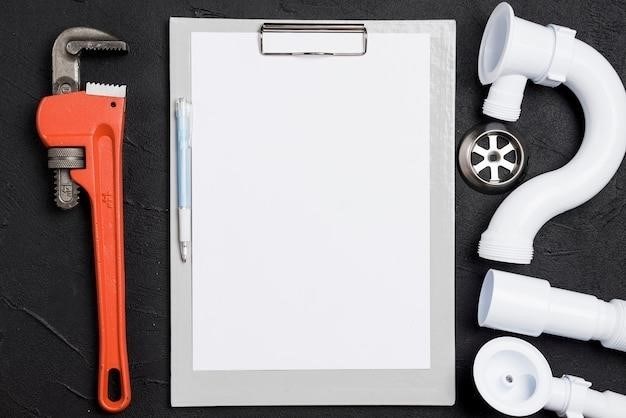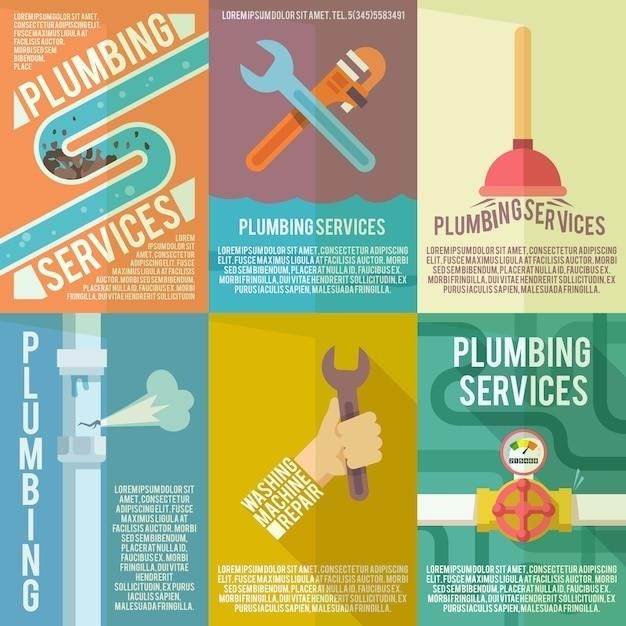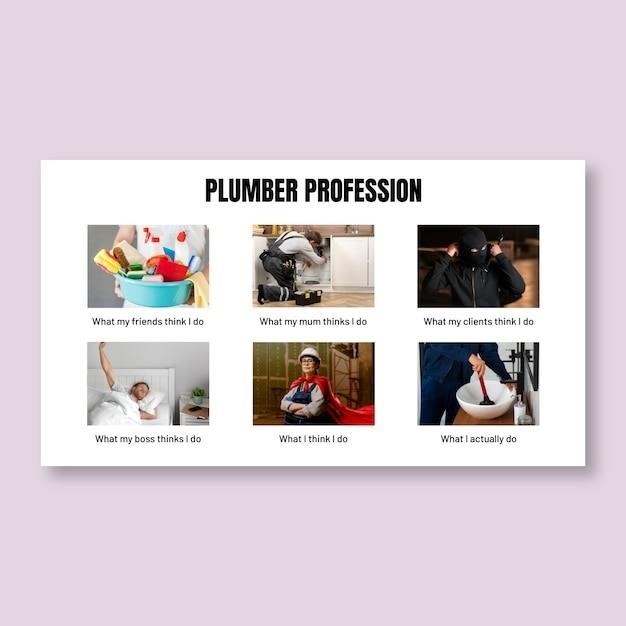
Plumbing Exam Prep Resources
Access free plumbing exam prep resources online. Many websites offer practice tests, sample questions with answer keys, and comprehensive study guides in PDF format. These resources cover various plumbing topics and question types to aid in exam preparation.
Free Practice Exams and PDFs
Numerous websites provide free plumbing practice exams in PDF format. These resources are invaluable for self-assessment and familiarizing yourself with the exam structure. Many offer a range of question types, mimicking the actual licensing exam. Look for PDFs that include detailed answer keys and explanations to help you understand the reasoning behind correct answers. This allows for focused study on weaker areas. Some free resources even include sample questions based on real past exams, giving you a realistic feel for what to expect on test day. Remember to use these resources strategically as part of your overall study plan.
Sample Questions and Answer Keys
Many online resources offer sample plumbing exam questions accompanied by detailed answer keys. These are incredibly helpful for targeted practice. The keys shouldn’t just provide the correct answer but also explain the underlying principles and relevant plumbing codes. This deeper understanding is crucial for success. Focus on understanding why an answer is correct, not just memorizing it. Utilize these samples to identify knowledge gaps and direct your further studies. Regularly reviewing these questions and answers reinforces learning and improves retention, leading to greater confidence on exam day. Combine this with other prep methods for comprehensive review.
Comprehensive Study Guides
Supplement practice questions with comprehensive study guides. These guides offer a systematic approach to learning, covering all essential plumbing topics in detail. Look for guides that address plumbing systems, pipe sizing and drainage calculations, and thorough explanations of relevant building codes and regulations. A well-structured guide will break down complex concepts into manageable sections, making learning more efficient. Interactive elements, diagrams, and real-world examples can enhance understanding and retention. Remember, a thorough understanding of fundamental principles is key to mastering more complex plumbing concepts. Use the study guide to create your own flashcards or summaries for enhanced memorization.
Types of Plumbing Exam Questions
Plumbing exams typically include multiple-choice questions, scenario-based problems requiring detailed solutions, and practical application questions testing real-world knowledge.
Multiple Choice Questions (MCQs)
Multiple Choice Questions (MCQs) are a common format in plumbing exams. These questions present a problem or scenario followed by several possible answers, with only one correct option. MCQs test a wide range of knowledge, from basic plumbing principles to complex code interpretations. They assess understanding of plumbing systems, fixtures, pipe sizing, drainage, and safety regulations. Successfully answering MCQs requires a thorough grasp of core plumbing concepts and the ability to quickly identify the most accurate solution among the choices provided. Practice with numerous MCQs is crucial for success, as it familiarizes you with the question format and helps identify knowledge gaps. Many online resources and study guides offer extensive MCQ practice sets for plumbing exams.
Scenario-Based Questions
Scenario-based questions present realistic plumbing situations requiring application of knowledge and problem-solving skills. These questions describe a specific plumbing problem or installation, often involving multiple components and potential issues. They might involve troubleshooting a leaky faucet, diagnosing a drainage blockage, or designing a section of piping for a new building. The questions assess your ability to analyze the scenario, identify the root cause of the problem, and propose appropriate solutions. Success in answering scenario-based questions depends on a thorough understanding of plumbing systems, codes, and best practices. Preparation involves studying various plumbing scenarios and practicing the application of your knowledge to resolve them effectively. Many practice exams include scenario-based questions to help you hone these crucial skills.
Practical Application Questions
Practical application questions test your ability to apply theoretical plumbing knowledge to real-world scenarios. These questions might involve calculations related to pipe sizing, water pressure, or flow rates. They could also require you to interpret plumbing diagrams, identify appropriate fittings and materials, or explain the proper installation techniques for various plumbing fixtures. Unlike multiple-choice questions, practical application questions often require detailed explanations and calculations to demonstrate a complete understanding of the topic. These questions are designed to assess your practical skills and problem-solving abilities in a plumbing context, mirroring the challenges you’ll face as a licensed plumber. Successful preparation involves practicing calculations, reviewing installation methods, and understanding relevant codes and regulations. Many online resources provide practice questions of this type.

Topics Covered in Plumbing Exams
Plumbing exams typically cover systems, fixtures, pipe sizing, drainage, and relevant codes and regulations. Expect questions on materials, installation, and safety protocols.
Plumbing Systems and Fixtures
This section delves into the intricacies of plumbing systems, encompassing a wide array of topics crucial for aspiring plumbers. Expect questions on various types of plumbing systems, including water supply systems, drainage systems, and vent systems. A thorough understanding of different pipe materials, their applications, and limitations is essential. Furthermore, familiarity with various plumbing fixtures, such as faucets, toilets, sinks, and showers, is critical. Knowledge of their installation, maintenance, and repair is often tested. The questions may also cover water conservation measures and energy-efficient plumbing fixtures. Finally, understanding the principles of water pressure, flow rates, and drainage is paramount for success. Prepare for detailed questions on these aspects of plumbing systems and fixtures.
Pipe Sizing and Drainage
A key area of plumbing exams focuses on the principles of pipe sizing and drainage system design. Understanding the factors influencing pipe diameter selection, such as flow rate, pressure drop, and friction loss, is crucial. Expect questions on calculating pipe sizes based on specific flow requirements and understanding the impact of different pipe materials on flow characteristics. Knowledge of various drainage system components, including traps, vents, and cleanouts, is essential. Questions may involve identifying appropriate venting methods for different fixtures and understanding the purpose of vents in preventing sewer gases from entering buildings. Furthermore, familiarity with local plumbing codes and regulations related to pipe sizing and drainage is vital for ensuring compliance and safe system design. Mastering these concepts ensures success in this critical exam area.
Plumbing Codes and Regulations
Plumbing exams extensively test knowledge of local, regional, and national plumbing codes and regulations. These codes dictate safe and efficient plumbing system installation and maintenance practices. Expect questions covering various aspects of these regulations, including material specifications, installation methods, and water conservation requirements. Understanding the differences between various types of plumbing codes, such as the International Plumbing Code (IPC) and the Uniform Plumbing Code (UPC), and their specific requirements is crucial. Furthermore, familiarity with relevant health and safety regulations, including those concerning backflow prevention and water treatment, is essential. Questions may involve interpreting code sections and applying them to specific scenarios. Thorough preparation in this area is vital for exam success, ensuring adherence to legal standards in plumbing practice.

Tips for Passing the Plumbing Exam
Effective study strategies, including practice exams and focused review of key concepts, are crucial. Time management during the exam is essential; understanding the format helps reduce anxiety.
Effective Study Strategies
Develop a comprehensive study plan that allocates sufficient time for each topic area covered in the plumbing exam. Prioritize your study time based on your strengths and weaknesses. Utilize a variety of study materials, including textbooks, online resources, and practice exams. Active recall techniques, such as flashcards and self-testing, are highly effective for improving knowledge retention. Form study groups with fellow exam candidates to share knowledge and discuss challenging concepts. Regularly review and reinforce previously learned material to prevent forgetting. Take regular breaks during your study sessions to avoid burnout and maintain focus. Practice time management by simulating exam conditions during practice sessions. Ensure you have a quiet and comfortable study environment free from distractions.
Time Management Techniques
Effective time management is crucial for success on the plumbing exam. Before starting, create a realistic study schedule that allocates sufficient time for each topic, considering your strengths and weaknesses. Break down your study sessions into manageable chunks, focusing on specific areas or concepts. Use timers during practice tests to simulate exam conditions and improve your pacing. Prioritize questions based on difficulty and point value, tackling easier ones first to build confidence. Avoid spending too much time on any single question; if you’re stuck, move on and return later if time allows. Learn to identify and eliminate incorrect answers quickly to save time. Regularly review your progress and adjust your schedule as needed. Practice under timed conditions to build stamina and efficiency. Remember to take short breaks to prevent fatigue and maintain concentration throughout the exam.
Understanding Exam Format
Familiarizing yourself with the plumbing exam format is key to success. Many exams include multiple-choice questions, scenario-based questions requiring problem-solving skills, and potentially practical application questions. Review past exams or sample questions to understand the question types and the level of detail required in your answers. Pay attention to the instructions carefully; understand how points are awarded and any specific requirements for answering. Practice answering questions under timed conditions to get used to the pace of the exam. Knowing the structure will help manage your time effectively. Look for patterns in question types to develop efficient strategies. The more familiar you are with the format, the more confident and prepared you will be. Identify your weak areas based on practice tests and focus your study efforts accordingly.